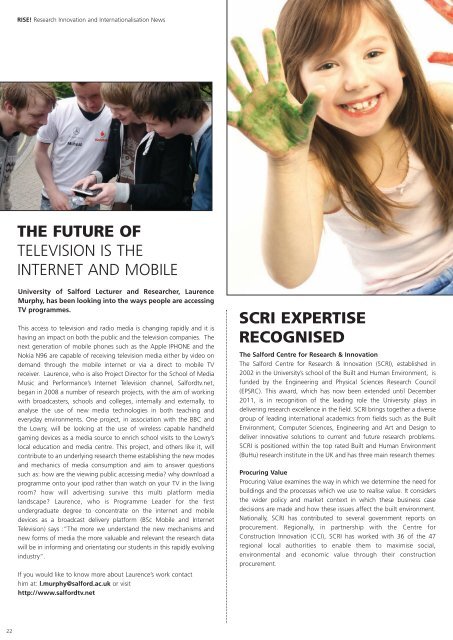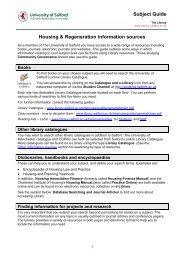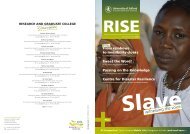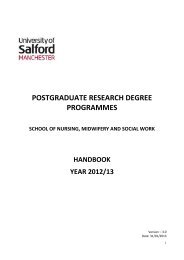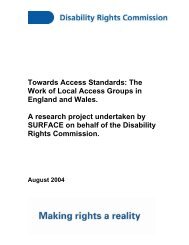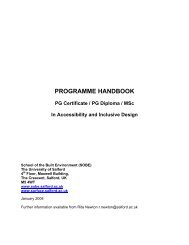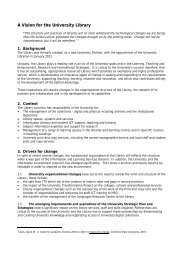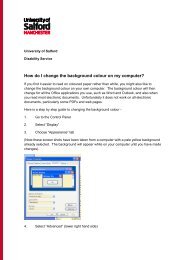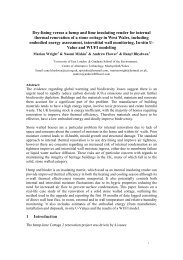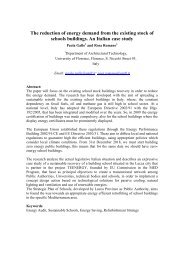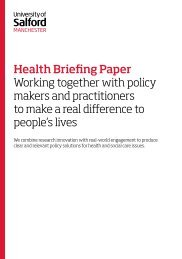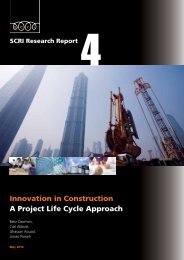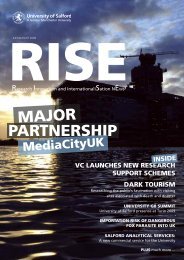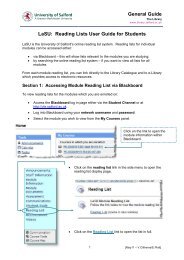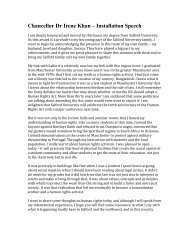RISE May-June 2009 - University of Salford
RISE May-June 2009 - University of Salford
RISE May-June 2009 - University of Salford
You also want an ePaper? Increase the reach of your titles
YUMPU automatically turns print PDFs into web optimized ePapers that Google loves.
<strong>RISE</strong>! Research Innovation and Internationalisation News<br />
THE FUTURE OF<br />
TELEVISION IS THE<br />
INTERNET AND MOBILE<br />
<strong>University</strong> <strong>of</strong> <strong>Salford</strong> Lecturer and Researcher, Laurence<br />
Murphy, has been looking into the ways people are accessing<br />
TV programmes.<br />
This access to television and radio media is changing rapidly and it is<br />
having an impact on both the public and the television companies. The<br />
next generation <strong>of</strong> mobile phones such as the Apple IPHONE and the<br />
Nokia N96 are capable <strong>of</strong> receiving television media either by video on<br />
demand through the mobile internet or via a direct to mobile TV<br />
receiver. Laurence, who is also Project Director for the School <strong>of</strong> Media<br />
Music and Performance’s Internet Television channel, <strong>Salford</strong>tv.net,<br />
began in 2008 a number <strong>of</strong> research projects, with the aim <strong>of</strong> working<br />
with broadcasters, schools and colleges, internally and externally, to<br />
analyse the use <strong>of</strong> new media technologies in both teaching and<br />
everyday environments. One project, in association with the BBC and<br />
the Lowry, will be looking at the use <strong>of</strong> wireless capable handheld<br />
gaming devices as a media source to enrich school visits to the Lowry’s<br />
local education and media centre. This project, and others like it, will<br />
contribute to an underlying research theme establishing the new modes<br />
and mechanics <strong>of</strong> media consumption and aim to answer questions<br />
such as: how are the viewing public accessing media why download a<br />
programme onto your ipod rather than watch on your TV in the living<br />
room how will advertising survive this multi platform media<br />
landscape Laurence, who is Programme Leader for the first<br />
undergraduate degree to concentrate on the internet and mobile<br />
devices as a broadcast delivery platform (BSc Mobile and Internet<br />
Television) says :”The more we understand the new mechanisms and<br />
new forms <strong>of</strong> media the more valuable and relevant the research data<br />
will be in informing and orientating our students in this rapidly evolving<br />
industry”.<br />
If you would like to know more about Laurence’s work contact<br />
him at: l.murphy@salford.ac.uk or visit<br />
http://www.salfordtv.net<br />
SCRI EXPERTISE<br />
RECOGNISED<br />
The <strong>Salford</strong> Centre for Research & Innovation<br />
The <strong>Salford</strong> Centre for Research & Innovation (SCRI), established in<br />
2002 in the <strong>University</strong>’s school <strong>of</strong> the Built and Human Environment, is<br />
funded by the Engineering and Physical Sciences Research Council<br />
(EPSRC). This award, which has now been extended until December<br />
2011, is in recognition <strong>of</strong> the leading role the <strong>University</strong> plays in<br />
delivering research excellence in the field. SCRI brings together a diverse<br />
group <strong>of</strong> leading international academics from fields such as the Built<br />
Environment, Computer Sciences, Engineering and Art and Design to<br />
deliver innovative solutions to current and future research problems.<br />
SCRI is positioned within the top rated Built and Human Environment<br />
(BuHu) research institute in the UK and has three main research themes:<br />
Procuring Value<br />
Procuring Value examines the way in which we determine the need for<br />
buildings and the processes which we use to realise value. It considers<br />
the wider policy and market context in which these business case<br />
decisions are made and how these issues affect the built environment.<br />
Nationally, SCRI has contributed to several government reports on<br />
procurement. Regionally, in partnership with the Centre for<br />
Construction Innovation (CCI), SCRI has worked with 36 <strong>of</strong> the 47<br />
regional local authorities to enable them to maximise social,<br />
environmental and economic value through their construction<br />
procurement.<br />
22


